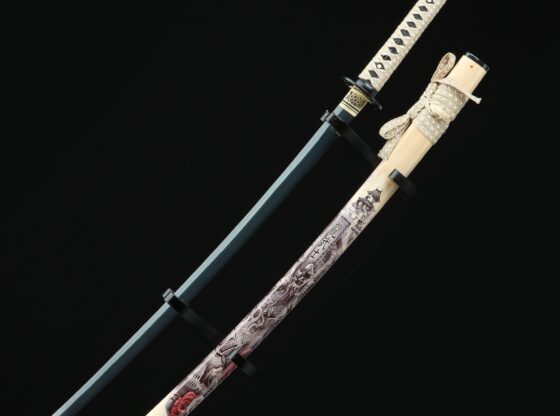The History and Significance of the Katana
The katana has been an integral part of Japanese culture for centuries, serving as both a practical weapon and a symbol of honor, discipline, and the samurai spirit. The sword’s history can be traced back to the Kamakura period (1185-1333), when the art of sword making reached new heights in Japan. During this time, master swordsmiths developed unique techniques that produced blades of unparalleled strength, flexibility, and beauty.
The Anatomy of a Katana
To fully appreciate the katana, it’s essential to understand its anatomy. The sword consists of several key components, each contributing to its overall performance and aesthetic appeal. The blade, known as the “ha,” is the most crucial part, forged from high-carbon steel and often featuring a distinctive hamon, or temper line. The hilt, or “tsuka,” is typically wrapped in ray skin and silk cord, providing a secure and comfortable grip. The scabbard, or “saya,” protects the blade and is often elaborately decorated with lacquer or other materials.
The Art of Katana Craftsmanship
The creation of a katana is a labor-intensive process that requires skill, patience, and dedication. Master swordsmiths, known as “swordsmiths” or “katanakaji,” follow a strict set of techniques passed down through generations. The process begins with selecting the finest materials, including high-carbon steel and tamahagane, a type of steel made from iron sand.
The Price of a Katana
The price of a katana can vary greatly depending on several factors, including the quality of the materials, the skill of the smith, and the sword’s historical significance. In general, a high-quality katana can cost anywhere from $2,000 to $50,000 or more. Factors that influence the price include:
- The type of steel used (e.g., tamahagane or modern steel)
- The number of folds in the blade (more folds generally mean a higher price)
- The skill and reputation of the smith
- The sword’s age and historical significance
- The quality of the hilt and scabbard materials
It’s important to note that the price of a katana is not solely based on its monetary value but also on its cultural and historical significance. Many collectors and enthusiasts are willing to pay high prices for swords with a rich history or created by renowned swordsmiths.
Also Read: Henry Olyphant The Son of Hollywood Star Timothy Olyphant
Buying a Katana in Japan
For those interested in purchasing a katana, Japan is the best place to start. The country is home to numerous sword shops and galleries, each offering a wide selection of swords at varying price points. When buying a katana in Japan, it’s essential to work with reputable dealers and ensure that the sword is authentic and legally obtained.Many sword shops in Japan offer tours and demonstrations, allowing visitors to learn more about the art of katana craftsmanship. Some shops even offer custom-made swords, allowing buyers to create a unique piece that reflects their personal style and preferences.
Caring for a Katana
Owning a katana is a responsibility that requires proper care and maintenance. To ensure the longevity and condition of a sword, it’s essential to follow these guidelines:
- Store the sword in a cool, dry place, away from direct sunlight and moisture
- Clean the blade regularly with a soft cloth and a mild cleaning solution
- Apply a thin layer of oil to the blade to prevent rust and corrosion
- Handle the sword with care, avoiding sudden movements or impacts
- Seek professional help for any repairs or maintenance needs
By following these simple steps, katana owners can ensure that their swords remain in excellent condition for years to come.
Conclusion
The katana is more than just a sword; it is a testament to the skill, dedication, and artistry of Japan’s master swordsmiths. From its rich history to its exceptional craftsmanship, the katana continues to captivate and inspire people worldwide. Whether you’re a collector, enthusiast, or simply appreciative of fine craftsmanship, exploring the world of katana swords is a journey worth taking.
FAQs
- What is the average price of a katana in Japan?
The average price of a katana in Japan can range from $2,000 to $50,000 or more, depending on various factors such as the quality of materials, the skill of the smith, and the sword’s historical significance. - Can I purchase a katana as a tourist in Japan?
Yes, you can purchase a katana as a tourist in Japan, but it’s essential to ensure that the sword is authentic and legally obtained. Work with reputable dealers and be aware of any legal restrictions or requirements for owning a sword in your home country. - How long does it take to create a katana?
The process of creating a katana can take several weeks to several months, depending on the complexity of the design and the skill of the smith. Master swordsmiths often spend years perfecting their craft and creating exceptional swords. - Can I use a katana for self-defense?
The use of a katana for self-defense is generally not recommended, as it requires extensive training and skill to wield effectively. In most countries, the possession and use of swords for self-defense purposes are heavily restricted or illegal. - How do I care for a katana?
Caring for a katana involves storing it in a cool, dry place, cleaning the blade regularly, applying a thin layer of oil to prevent rust and corrosion, and handling the sword with care. It’s also essential to seek professional help for any repairs or maintenance needs.


